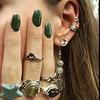Take a photo of a barcode or cover
informative
fast-paced
adventurous
challenging
funny
informative
fast-paced
"One cheats himself as a human being, if one has respect only for the style of high culture".
With reverent seriousness and a wink and a nod to academic rigor, Sontag charmingly lays out her treatise on Camp. She acknowledges as she does so, that by attempting to define the sensibility, she is flattening or "betraying" it somehow. But what is camp if not the flattening of all things into revelatory artifice? Truly a delightful read.
With reverent seriousness and a wink and a nod to academic rigor, Sontag charmingly lays out her treatise on Camp. She acknowledges as she does so, that by attempting to define the sensibility, she is flattening or "betraying" it somehow. But what is camp if not the flattening of all things into revelatory artifice? Truly a delightful read.
challenging
emotional
funny
informative
reflective
fast-paced
challenging
informative
inspiring
fast-paced
informative
inspiring
reflective
fast-paced
informative
reflective
slow-paced
Fun read. I think when you're reading a cultural essay from the mid-60s it's not going to feel completely accurate, just because the world is so mutable, so you kind of have to go into this with your expectations tempered, knowing that not everything is still going to be relevant. It was interesting to me how she argues that "All About Eve" isn't camp when today it's remembered as being VERY campy. I think something like "Camp" is maybe not entirely something you can accurately define (it feels like the good old "I can't define it but I know it when I see it" definition), but it's nonetheless interesting to see someone try to academically define what "Camp" is, even if I don't entirely agree with her sentiment. I loved her exploration of Camp embracing androgyny and vulgarity and exaggerated performances of social norms, how everything was "in quotations"; 'a lamp becomes a "lamp"', etc. And in that vein, by her own arguments I disagree that it's not political. I think any artistic challenging of the status quo is inherently political, even if it's through aesthetics. Nonetheless I liked and agreed with her conclusion that "camp is good because it's awful", and that a big part of that comes from naive seriousness rather than a deliberate attempt to be campy.
The second essay "One Culture and the New Sensibility" is a reaction to criticisms of the nature of then-contemporary art, which obviously isn't a kind of discourse I have direct experience with but was nonetheless interesting to read from a "future" perspective, and even then there's a lot still relevant today. I thought it was particularly interesting when Sontag argued that "boredom" doesn't exist, it's a form of frustration and that's still a kind of emotional response.
The second essay "One Culture and the New Sensibility" is a reaction to criticisms of the nature of then-contemporary art, which obviously isn't a kind of discourse I have direct experience with but was nonetheless interesting to read from a "future" perspective, and even then there's a lot still relevant today. I thought it was particularly interesting when Sontag argued that "boredom" doesn't exist, it's a form of frustration and that's still a kind of emotional response.
This is hilarious! I didn’t expect to enjoy this and it made me really think about the fun architectural wonders that I love and how it borders the ridiculous and the serious. It warms my heart that there’s a certain aesthetic that encompasses works of art that are (to a degree) “so bad it’s so good”.
it’s great. i really enjoyed notes on ‘camp’, an easy to read collection of points that summarise camp culture. one culture and the new sensibility was more of an essay, which i wished was longer because it was interesting but its brevity didn’t make room for the best structure. really enjoyed this, want to read more of susan sontag’s work
informative
reflective
medium-paced








